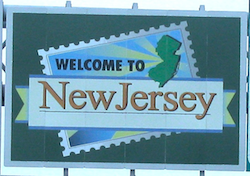Praise the Poker Gods: New Jersey, Delaware, Nevada to Share Player Pools
Regulated online poker in the United States has been a thing for four years now, but it has only been since March 2015 that Delaware and Nevada have shared their online poker liquidity, that is, allowing players in one state to play on the poker sites of the other state. Up until then, players could only play on their own state’s sites and consequently, could only compete against players in their own state.
New Jersey, though, was not on board and really had not even publicly expressed all that much interest in getting together with Nevada and Delaware. Well, all that has changed, as almost out of nowhere, New Jersey Governor Chris Christie announced on Friday that the Garden State has entered into an agreement with the other two states to share player pools across each. Glory, glory, hallelujah!
“New Jersey has been a pioneer in the development of authorized, regulated online gaming, which has been a budding success since its launch in late 2013,” Governor Christie said in a press release. “Pooling players with Nevada and Delaware will enhance annual revenue growth, attract new consumers, and create opportunities for players and Internet gaming operators. This agreement marks the beginning of a new and exciting chapter for online gaming, and we look forward to working with our partners in Nevada and Delaware in this endeavor.”
 While for our interests, this development is most interesting (and most important) for online poker, other online casino games are included in the agreement, as well. As you probably well know, liquidity sharing – the combining of player pools from each state – benefits online poker immensely because poker is so dependent on player traffic. The more players that are available, the more customers poker sites can get, that much is obvious. But beyond that, online poker rooms with high – or at least acceptable – player traffic tend to grow, while sites with low traffic tend to diminish. Success begets success, failure begets failure.
While for our interests, this development is most interesting (and most important) for online poker, other online casino games are included in the agreement, as well. As you probably well know, liquidity sharing – the combining of player pools from each state – benefits online poker immensely because poker is so dependent on player traffic. The more players that are available, the more customers poker sites can get, that much is obvious. But beyond that, online poker rooms with high – or at least acceptable – player traffic tend to grow, while sites with low traffic tend to diminish. Success begets success, failure begets failure.
To illustrate, if a player loads up an online poker room and sees there are plenty of active tables at various stakes and game varieties, he is much more likely to make a deposit and stay a while. Player traffic generates more player traffic because the poker room is attractive. On the flip side, if a potential customer checks out a poker site and sees a barren hellscape, chances are he won’t give the poker room a chance. Why sit down only to hope someone else takes a seat with you? Why play somewhere that can’t even put together a decent tournament field? Low player traffic spirals into lower player traffic.
The obvious significance of New Jersey’s joining up with Delaware and Nevada is New Jersey’s size. It is the 11th largest state by population with an estimated nine million residents. Delaware and Nevada have fewer than four million combined. New Jersey’s addition should give a nice boost to the other two states’ poker rooms.
New Jersey’s online poker industry, though, hasn’t been what one would consider thriving. September online poker revenue was about $1.9 million, down 5.7 percent from the same month last year. Total online poker “win” for the year so far is $18.6 million, down 6.8 percent from the same period last year. Online casino revenue is doing quite well, though, with September’s win at $18.5 million, an impressive 30.1 percent increase compared to September 2016. And the total for the year is $165.1 million, up 32.5 percent from last year.
Looking at online poker player traffic, PokerScout is showing a seven-day average of just 230 cash game players across the three New Jersey networks combined. The player traffic for the Nevada and Delaware sites is 130 cash game players.
There has been no indication as to exactly when the shared liquidity will start, but since online poker regulation has never been a swift process, one might guess it will take at least a few months (but who knows, maybe they will surprise us). The regulatory agencies of all three states will have to approve each operator and software provider.
Speaking of operators, it appears that this will be quite the boon to WSOP.com and 888. The two have teamed up in both Nevada and New Jersey and Delaware’s lottery-operated sites all run 888’s software, so the partnership should be able to fairly seamlessly flip the switch on a three-state network.
For those of us in states without regulated online poker, none of this really matters right now, but it could be important in the future for players in the states where there has been some movement on poker legalization. With New Jersey Poker in the interstate mix, it will be that much more attractive to newly regulated states to join up, and if that happens, the U.S. online poker market could experience rapid growth. And then – and I know I’m being wishful here – if the financial numbers appear perky, states that weren’t previously considering online poker might start paying attention.
Friday the 13th unlucky? Could’ve fooled me.



















COMMENTS